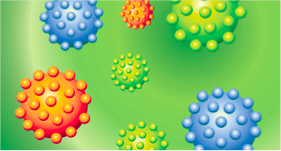Candida albicans is an opportunistic and polymorphic fungus that causes mucosal, disseminated, and invasive infections in humans. Transition from the yeast form to the hyphal form is one of the key virulence factors in C. albicans contributing to macrophage evasion, tissue invasion and biofilm formation. Nontoxic small molecules that inhibit C. albicans yeast-to- hypha conversion and hyphal growth could represent a valuable source for understanding pathogenic fungal morphogenesis, identifying drug targets and serving as templates for the development of novel antifungal agents. In this study, the authors identified the triperpenoid saponin family of gymnemic acids (GAs) as inhibitor of C. albicans morphogenesis. GAs were isolated and purified from Gymnema sylvestre leaves. The results showed that purified GAs had no effect on the growth and viability of C. albicans yeast cells, but inhibited its yeast-to-hypha conversion under several hypha-inducing conditions, including the presence of serum. In addition, GAs promoted the conversion of C. albicans hyphae into yeast cells under hypha inducing conditions. They also inhibited conidial germination and hyphal growth of Aspergillus sp. Finally, GAs inhibited the formation of invasive hyphae from C. albicans infected Caenorhabditis elegans worms and rescued them from killing by C. albicans. PLoS ONE. 2013. PMID: N/A









